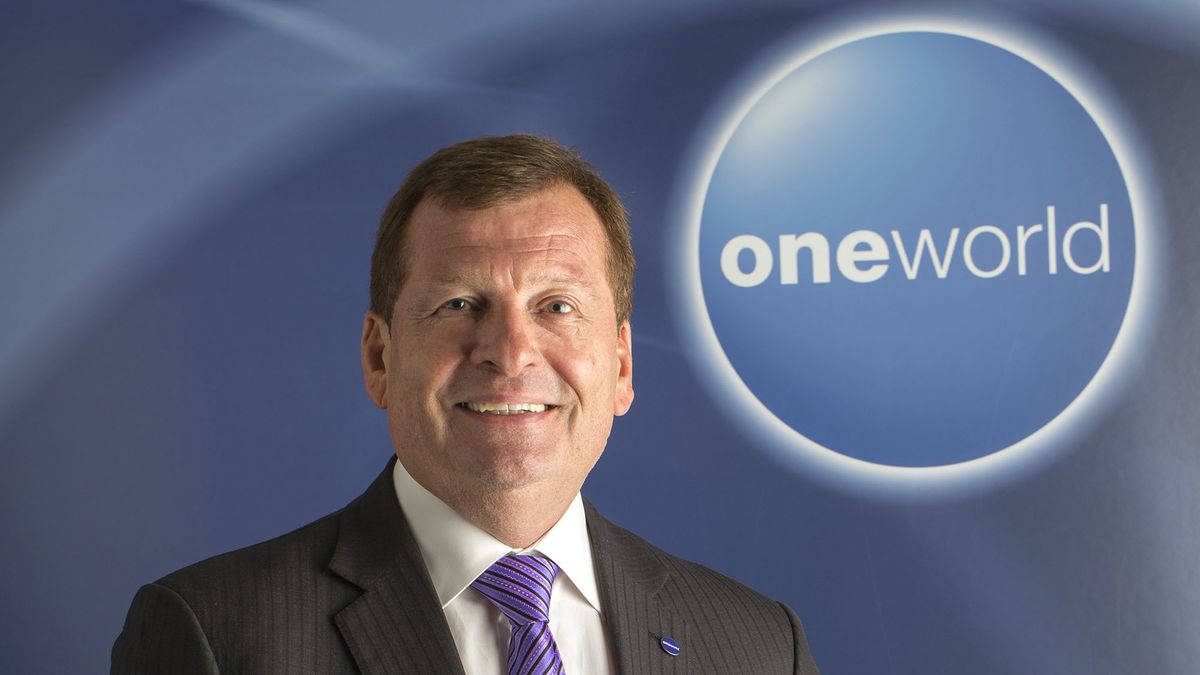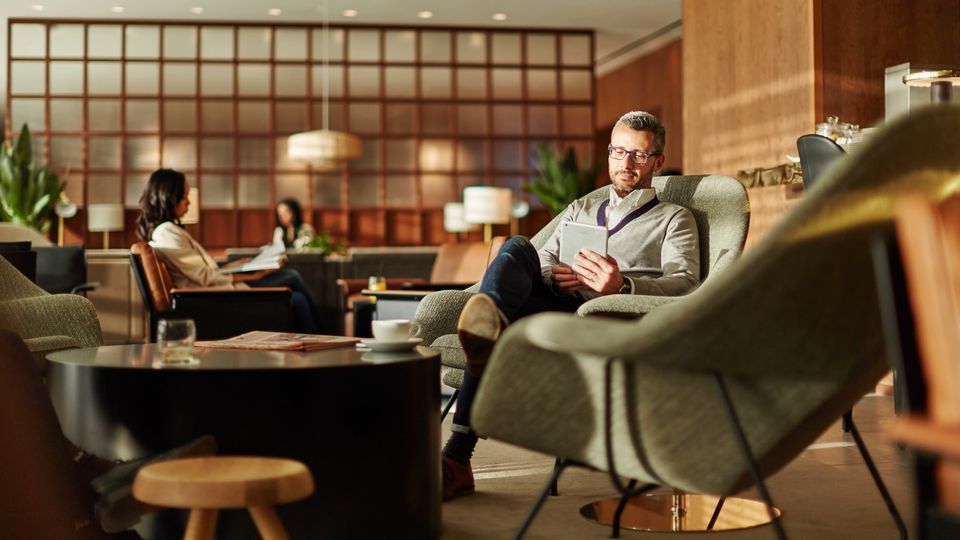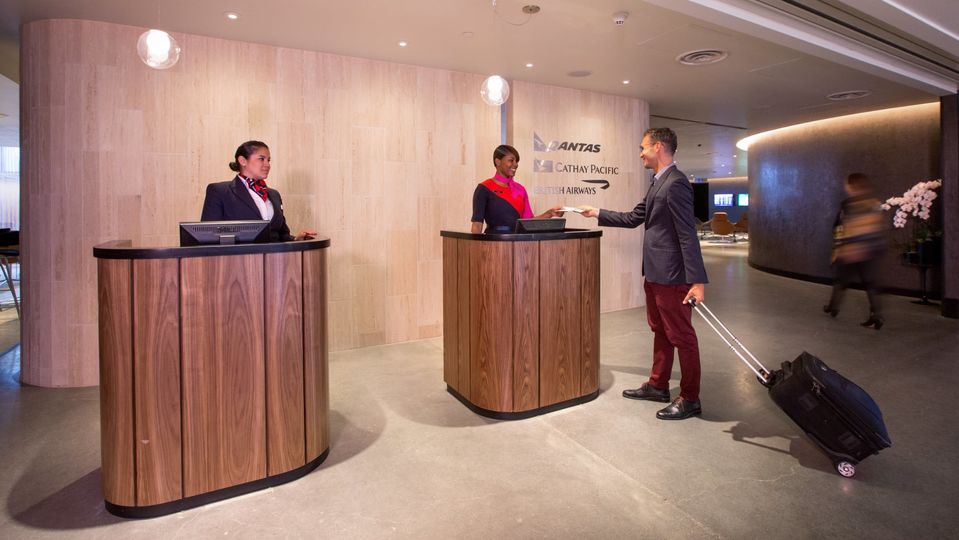Oneworld CEO sees COVID-19 leading to airport lounge consolidation
As airlines 'shrink to surive', Oneworld's Chief Executive expects many will work together more closely by sharing lounges.

Even when international travel begins to bounce back, some airline lounges may remain shuttered for good: especially at airports served by several members of the same alliance group.
Oneworld CEO Rob Gurney suggests that as airlines reshape their operations to suit the cost-constrained pandemic era, they'll also rethink the role of their own airport lounges in favour of sharing other consolidated spaces.
“There are airports around the world that are served by multiple Oneworld carriers, where they have multiple Oneworld lounges, all within the same campus or facility at an airport,” Gurney noted at this week’s CAPA Live online forum.
“I think the opportunities to drive and to consolidate, and to drive better asset efficiency across those sorts of things, are certainly going to be part of what we do, and how we pivot and change as alliances.”
One such airport is London Heathrow, which is home to no less than 16 lounges operated by Oneworld airlines across three terminals, in addition to independent lounges still used by some alliance members.
Home carrier British Airways has seven lounges across two terminals; American Airlines, Cathay Pacific, Malaysia Airlines, Qantas and Qatar Airways also operate lounges of their own.
Historically, those facilities were all needed to properly cater for the volume of travellers passing through the UK’s busiest gateway – but many of those lounges are now closed, with airlines having been shuffled between terminals: making use of the lounges of other airlines or operators.
The Heathrow headache
As well as catering for the endless stream of business and premium travellers that had been flying through Heathrow, many of the airport’s Oneworld lounges were also necessary, simply because Oneworld’s many airlines were split across multiple terminals.
Prior to COVID-19, British Airways flights were using both Terminal 3 and Terminal 5, for instance, with its Joint Venture partner Qatar Airways over in Terminal 4, as was Malaysia Airlines.
As well as hosting a shortlist of non-alliance carriers, T4 had otherwise been home to SkyTeam – so much so that Qatar Airways had been directing frequent flyers to T4’s SkyTeam Lounge in place of Qatar’s own Premium Lounge here, which was designed only for first and business class flyers.
Another close BA partner, American Airlines, resided over at Terminal 3, as did others like Cathay Pacific and Qantas.
“One of the things that’s been very challenging to do, certainly for Oneworld, (is) how we actually get ourselves consolidated and co-located around the airports,” Gurney continues.
“(But) when we’re looking at existing facilities, we now have an opportunity to also reengage with airports: as the restart happens, how do we get more effective and more efficient around how we allocate those resources (lounges).”
Of course, it’s expected that in the longer term, airlines that had moved house will eventually return to their former Heathrow homes.
This makes Heathrow less of a contender for lounge consolidation than other airports served by multiple Oneworld airlines with multiple Oneworld lounges: but the difficulties faced elsewhere will be similar.
Oneworld-branded lounges enter the fold
Prior to COVID-19, Oneworld had been on-track to open the first of what would eventually become many alliance-branded lounges – as already offered by competitors Star Alliance and SkyTeam.
The first of these had been announced for Moscow's Domodedovo Airport: a major hub of Oneworld member S7 Airlines, which does offer its own lounge: but one primarily designed and located for domestic travellers.
Choosing Moscow for the first 'Oneworld Lounge' represents a shift from Oneworld's original statement of intent, about where its own lounges would be located.
Speaking with Executive Traveller in February 2019, on the sidelines of a press conference in London to mark the alliance's 20th anniversary, Gurney said the lounges would focus on airports or terminals that aren't the home hubs of any Oneworld alliance carriers.
“The idea is that we develop these where no single airline has a massive presence, but we have multiple airlines flying into the same airport ... (and) no single airline could justify the cost of the lounge,” Gurney said at the time.
With Berlin's Brandenburg Airport shortly due to open, with planned flights from British Airways, Finnair, Iberia, S7 Airlines and Qatar Airways, it remains to be seen whether one of these airlines will open an own-brand lounge, or whether carriers, and Oneworld, will work together on another alliance-branded facility.
In May, a spokesperson for British Airways was unable to confirm there'd be a BA-brand lounge at Brandenburg, telling Executive Traveller only that “we will definitely have a lounge proposition for customers.”
Read more: Berlin Brandenburg Airport lounges: Lufthansa, maybe Oneworld too?
Alliances still provide value, says the Oneworld boss
When asked whether traditional airline alliances still have a place in the currently landscape, Gurney, as you’d expect, believes they do.
“I still think the fundamental benefits that alliances offer customers are going to be highly valued: access to reciprocal priority services, access to lounge networks, reciprocity of earning miles or points in frequent flyer programs, and so on.”
“But I think we have to recognise that we have to deliver those priority services to customers in a more efficient asset optimisation way, and that would be, I think, where we would be applying most of our energies and efforts.”
Airport priority services for frequent flyers and premium class travellers typically include priority check-in, priority security screening, and priority boarding.
Oneworld’s rival, Star Alliance, has already achieved such consolidation at Heathrow.
With all Star Alliance flights under the one roof at Terminal 2, and almost every member of the alliance normally serving Heathrow, check-in services are shared between airlines, rather than segregated.
A passenger flying on Singapore Airlines can check-in at the same counter as a traveller booked on EVA Air, for example. Only United has its own reserved check-in area, in order to accommodate heightened security screening requirements on US-bound flights.
The Oneworld alliance will expand come early next year with US carrier Alaska Airlines jumping on board from March 31 2021.
Back in July, Gurney also revealed Oneworld’s plans to roll out alliance-wide frequent flyer upgrades to business class and first class: allowing a traveller to use points or miles from one airline, for a bump-up on another.
Read: Oneworld plans alliance-wide business, first class upgrades


29 Apr 2020
Total posts 13
This is all well and good as long as it does not lead to over capacity and being turned away!
23 Feb 2015
Total posts 262
I’m surprised it took a crisis to kick this off, or maybe it is just being used as cover for something already in the works. Why Cathay bothers with its lounge in Melbourne, for example, has always baffled me.
Hi Guest, join in the discussion on Oneworld CEO sees COVID-19 leading to airport lounge consolidation